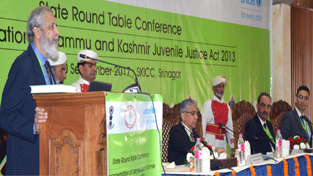
Excelsior Correspondent
SRINAGAR, Sept 9: Justice Madan B Lokur, Judge Supreme Court of India today said that Jammu and Kashmir has enough lessons to learn from other States on implementation of Juvenile Justice (Care and Protection of Children) Act so that children, who are in conflict with the law, are properly counseled, rehabilitated and reintegrated with the society.
Addressing 2-day State Roundtable Conference on Implementation of Jammu and Kashmir Juvenile Justice (Care and Protection of Children) Act, 2013 at Sher-e-Kashmir International Convention Centre (SKICC) after inaugurating the same, Justice Lokur stressed the need to implement J&K Juvenile Justice Act in letter and spirit and called upon all the stakeholders to work in tandem to set up Juvenile Justice Boards, Child Welfare Committees, Advisory Boards and Observation Homes which are a prerequisite for the effective implementation of the Act.
He said, “children are the future of society and its duty of the society to take care of juveniles”, adding “children who are in conflict with the law need to be counseled, rehabilitated and reintegrated with the society”.
Justice Lokur said the J&K Juvenile Justice (Care and Protection of Children) Act 2013 is a robust effective and responsive legislative framework for children who are in need of care and protection as well as children in conflict with the law. He said the approach of the executive and the judicial system should be aimed at addressing the vulnerabilities of the children and ensuring their rehabilitation, adding that the idea behind rehabilitation is that people are not born criminals thus should be given a chance to be restored and reintegrated with society.
The Supreme Court Judge called for addressing the shortcomings in the Act for its effective implementation. “The Act is still in infancy in the State and J&K has enough lessons to learn from other States which have already implemented similar laws and learn from the shortcomings in the other States to rectify their own”, he said, adding “if the required infrastructure expected by the Act and Rules is available, there is no doubt that the statuary functionaries will be able to put in place appropriate remedial measures”.
He further stated that by placing oriented and interested judicial officers and professional social workers in place in the Juvenile Justice Boards, substantial progress can be made in the mission of rehabilitating children in conflict with the law.
Speaking on the occasion, Chief Justice J&K High Court Justice Badar Durrez Ahmed said the law enforcing agencies need to be extra cautious and sensitive in J&K while dealing with the juveniles as the children in State have been brought up in a very violent atmosphere that has affected their mental as well as the physical growth.
“The juveniles have to be treated differently and the one dealing with juveniles should have great understanding and extra sensitive towards the children”, he said, adding “children are the backbone of human civilization and shall shape its destiny in future”,
He further said, “regardless of the political, economic or social philosophy of a Government, welfare of the children is of the utmost importance and must be given top priority”.
While identifying that in the disturbed socio-political climate of J&K, the problem is magnified; Chief Justice stressed on the State Government to adopt effective and proactive measures to, not only rehabilitate the juveniles who do come into conflict with law, but also prevent juveniles from coming into conflict with the law.
He said the judiciary has played vital role in sensitizing all the stakeholders by bringing them together and in identifying workable solutions in order to trigger changes at the ground level.
Earlier, in his welcome address, Chairman J&K Juvenile Justice Board Justice Ali Mohammad Magrey said, “though the Juvenile Justice Act is intact in the State, still we are struggling to realize the dream of setting up of child friendly institutions”, adding “the State has to contemplate the legal response with respect to two categories of children including those who are in conflict with law and those in need of care and protection”.
He said to achieve the objectives of the Act there is dire need for creation of institutions including Juvenile Justice Boards, Childcare Institutions, Special Juvenile Justice Police Units etc. He pinned hope upon the two-day conference that it will sensitize all the stakeholders, particularly the State departments and hoped that a strong will power will emerge for creation of physical framework in support of the juvenile justice system in the State.
Chief Child Protection UNICEF India, Javier Aguilar said the UNICEF is committed to work with the existing systems to ensure rights of the children especially their protection from various forms of abuse, exploitation, neglect, discrimination and any form of violence.
He said UNICEF has made a modest beginning with the State Government, judiciary, academia, civil society and other stakeholders. “Efforts are underway to ensure that a comprehensive and coordinated system is established in the State in order to ensure children have access to justice, services and support as guaranteed under Constitution of J&K and various other special laws applicable to the State”, he added.
Commissioner for Persons with Disability Mohammad Iqbal Lone made a detailed presentation of the steps being taken by the Government for the implementation of the Act.
Others who were present in the conference include Judges of the J&K High Court, Justice R Sudhakar, Justice Mohammad Yaqoob Mir, Justice Alok Aradhe, Justice D S Thakur, Justice Tashi Rabistan, Justice Janak Raj Kotwal, Justice B L Walia, Justice Sanjeev Kumar, Justice M K Hanjura and Justice Sanjay Kumar Gupta, Judges of the subordinate courts, Secretary Law, Special DGP VK Singh, academicians from various universities and law schools, police officers, social workers and volunteers.
The conference is being jointly organized by Juvenile Justice Committee of the Supreme Court of India and Juvenile Justice Committee of JK High Court and supported by UNICEF.

